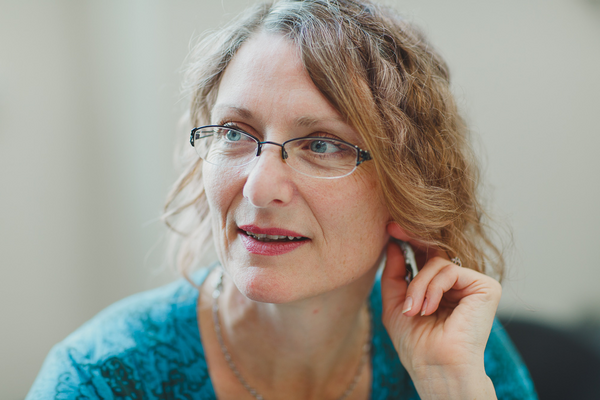 Where others might see deficits, Patricia (Patty) Douglas, Ph.D., M.A., B.Ed., sees difference as fundamental to the world, an affirming perspective she brings with her to the role of inaugural Chair in Student Success and Wellness at the Faculty of Education.
Where others might see deficits, Patricia (Patty) Douglas, Ph.D., M.A., B.Ed., sees difference as fundamental to the world, an affirming perspective she brings with her to the role of inaugural Chair in Student Success and Wellness at the Faculty of Education.
Patty says she is thrilled to be taking on this new position at Queen’s, which builds on her extensive experience including work as a special education teacher before moving into postsecondary research and teaching on topics of disability studies and inclusive education. She also identifies as neurodivergent and invisibly disabled, and has first-hand experience advocating within the public education system for her son who is autistic.
“As a special education teacher, I witnessed well-intended educators unable to respond positively to students with differences,” Patty recalls. “I saw some very concerning things - restraints happening in schools that I didn't think needed to happen. I saw exclusions and I experienced that as a mother with my own son.”
In reflecting on how her path brought her to Queen’s, Patty credits a compilation of life and professional circumstances, along with a passion for shifting mindsets in the larger context of education.
“I decided I needed to do something to shift the story. In the West, we have inherited a deficit story of autism and neurodivergence - that there's something wrong with development or wrong with a child's brain or behaviour that we need to fix,” Patty explains. “And I knew as a mother and as someone who's neurodivergent that wasn't how I understood it. I believe very strongly in the power of story and the arts to shift mindsets.”
Her research and advocacy includes leading Re•Storying Autism in Education, a multimedia storytelling project that brings “together Autistic people, family members, practitioners, educators, and artists to rethink practice in ways that desire the difference of Autism.”
Building relationships to bolster research
In her new role as Chair in Student Success and Wellness, Patty will focus on brokering relationships to support and mentor historically excluded populations, including students and faculty identifying with 2SLGBTQ+, Black, and Indigenous communities.
In September, she will teach a multimedia storytelling course on student success and wellness from a disability studies perspective. It’s intended to be the first in a series of courses for both undergraduate teacher candidates and graduate students touching on these topics. Patty will also help secure funding and coordinate logistics for the upcoming launch of a new research centre focused on student success and wellness.
“This new Chair role and the research centre are visionary and unique in Canada. We knew before COVID, as well as post-COVID, that postsecondary students were struggling,” Patty says. “A focus on wellness will help us identify the conditions we need to create so that all students can thrive.”
The research centre will house many of the projects Patty has been working on along with those she hopes to propose, including research on disability justice, addressing the stigma of Fetal Alcohol Spectrum Disorder, and mad mothering. While varied, most of her research projects are nationally and internationally scoped with storytelling as a key approach to sharing findings, and will engage as many interested students and faculty members as possible. Collaborators will include the academic community at Queen’s and researchers at other universities around the globe, along with community and Indigenous partners.
Decolonizing understandings of disability and neurodivergence
The intended outcome of her collective efforts - in addition to overall student success and wellness for graduate students, teacher candidates, public school students, families, and the community at large - is to bring to the classroom an affirming decolonizing approach to disability, autism, and neurodivergence.
Patty describes herself as learning with humility alongside Indigenous partners and other cultures, and has already been deeply impacted by alternative approaches to understanding differences.
During COVID, Patty collaborated on an online storytelling workshop series with colleagues at Massey University and Taonga Takiwātanga Trust in New Zealand, where she first learned the Māori phrase tōnā anō Takiwātanga, meaning “in their own time and space.”
“In Māori culture, there is no word for disability or what we've come to call autism in the West. It is understood as a different way of thinking and being in time and space,” Patty shares. “So in the classroom, if somebody needs to pace, they're breaking away from the group, they're doing something different in time and space and they're thinking differently.”
Patty says she is also learning from works such as those by Samson Cree Nation member Grant Bruno, who is working in the Canadian context to reframe how differences are viewed.
“I’m learning that many Indigenous cultures, nations and worldviews don't look at disability as a deficit, but as a gift to community. All children and all people are looked at for the strengths and gifts they bring to community,” she says.
By collaborating with Indigenous partners, Patty is seeking to reframe perspectives and decolonize disability and autism in the context of education. Part of this process would include shifts in pedagogical approaches and curriculum within teacher and graduate education, as well as public schools.
“It would look like shifting away from a results-focused system to a process-focused system. It would be understanding the folks you have in the room at the time and looking at inclusion as a process rather than sort of an end result,” she explains.
Patty says working to affect change within the field of education provides hope for a better and different way forward into the future, supporting other justice and equity-seeking movements.
“Education and working with young people is radically hopeful, to borrow Kevin Gannon's phrasing,” she says. “It's what we do and how we do it, the practice of pedagogy, that can change worlds.”